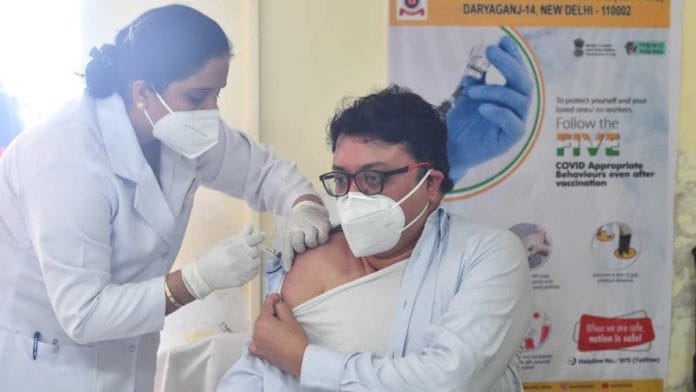New Delhi: Mutant strains of SARS-CoV-2, the virus that causes Covid-19, have been detected in both Maharashtra and Kerala but there is no reason to link the variant strains to the recent case upsurge in the two states, NITI Ayog member (health) Dr V.K. Paul said Tuesday.
Kerala, which had 55,752 active cases as of Tuesday, and Maharashtra, with 54,306 active cases, account for 75 per cent of India’s total caseload.
“When we do sequencing, we are looking for any abnormal shift and we must say that it was going on even before the UK variant entered,” Paul said at the government’s Covid briefing Tuesday.
“Mutations are the nature of the virus. So, there are other variables… I would like to confirm that the N440K (one of the strains found in India, especially southern states) and E484K (UK) variants have been detected in Maharashtra and Kerala. But mere detection is not enough. To relate occurrence of virus to a change in disease pattern, epidemiological and clinical information have to be linked,” he added.
Paul said these variants have been detected in India — “and also the other two (Brazil, South Africa)” — but “there is no reason for us to believe on the basis of scientific information that these are responsible for the upsurge in some districts of Maharashtra and Kerala”.
The consortium of 10 government laboratories that was set up some time back to conduct genome sequencing on the SARS-CoV-2 virus has so far analysed 3,500 samples.
“Among these, the UK variant was picked up in 187 samples through this process of sequencing, South Africa variant was detected in six, and Brazil variant in one,” Paul said.
Also Read: Top WHO official backs Covaxin, says evidence maybe limited but India has every right to approve
No SOP for poll rally?
At the briefing, both Paul and Indian Council of Medical Research (ICMR) Director General Dr Balram Bhargava reiterated the need to adhere to Covid-appropriate behaviour such as masking, hand hygiene, and staying clear of crowds.
Sero-positivity — the level of Covid antibodies in a person, used as a measure of a population’s exposure to the virus — has been found to be low outside of urban conglomerates, which means large swathes of the population are still vulnerable, they said.
However, asked about restrictions — if any — on public meetings during the five upcoming assembly elections, Union Health Secretary Rajesh Bhushan referred to the Standard Operating Procedures (SOPs) on the health ministry website without elaborating any further.
The SOPs do not dwell on political meetings, although there is one on conducting Covid-appropriate festivities.
Vaccination updates
So far, Bhushan said, 68 per cent of registered healthcare workers have been given the first dose of the Covid-19 vaccine, and 62 per cent of those eligible have received the second dose.
A person becomes eligible for the second dose only after four weeks of receiving the first one.
As many as 41 per cent of frontline workers have also been vaccinated in the three weeks since vaccinations opened up for them, he added.
Till 1 pm Tuesday, 1,17,54,788 — around 1.18 crore — vaccinations had been completed, with Rajasthan (75.8 per cent), Himachal Pradesh (76.2 per cent) and Uttar Pradesh (76.2 per cent) emerging as the leading states in administration of the first dose of the vaccine to registered healthcare workers.
Tamil Nadu (52.1 per cent), Punjab (39 per cent) and Delhi (first dose 51.6 per cent) continue to lag.
Replying to a question on the involvement of the private sector in Covid-19 vaccinations, Bhushan said, of the 10,000 hospitals across the country where vaccinations are currently on, 2,000 are private.
The private sector, he added, also plays an important role in myriad government health schemes such as the Central Government Health Scheme (for cashless treatment) and the Pradhan Mantri Jan Arogya Yojana, the tertiary care arm of Ayushmann Bharat, the flagship health programme of the NDA government.
Also Read: 3-month gap between doses of Oxford vaccine more effective against Covid, Lancet study finds






